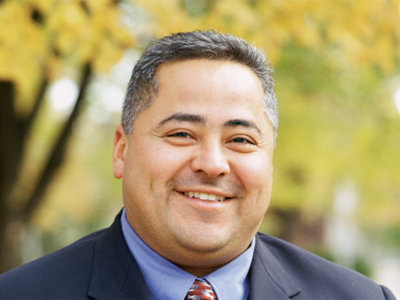School board elections take place on April 2 and in order to help you make a more informed decision at the polls in this race, which often flies under the radar, we’ve asked each of the seven candidates – running for four seats on the 9-member board (there are eight regional districts and one at-large seat) – to respond to a list of questions and we will run them in the weeks leading up to the April 2 election.
Today, we hear from Angel Sanchez, who is running against Jaime Alvarado and Tatiana Joseph for the seat representing District 6, on the city’s South Side. Peter Blewett, who currently holds that position, is not running for re-election. A map of districts is here. A District 6 primary is slated for Tuesday, Feb. 19.
OnMilwaukee.com: Tell us about your background and how your experience will be an asset to the Milwaukee Public Schools board.
Angel Sanchez: I grew up in the Historic Walker’s Square neighborhood and started working at the age of 6. My parents taught us to take pride in our work and do whatever it takes to get the job done.
My life has been spent working hard in many different sectors, from a personal fitness instructor, to sales, starting a home improvement business, teaching in the MPS, to becoming alderman in the City of Milwaukee (2000-2004).
OMC: Are you a graduate of MPS or other public schools? Do you or did you have kids in MPS?
AS: I am a proud graduate of the MPS and UW-Milwaukee. My son Jacob is 8 years old, and is currently home-schooled. My daughter Sam will be 2 years old this March.
OMC: What do you think is the biggest issue facing MPS and what is your plan for dealing with it?
AS: The biggest issue facing the MPS is fiscal solvency. The MPS needs to rebrand itself and separate itself by being different than other schools that compete for dollars. Our students, faculty and administration should recognize the future trends and where the jobs will be. The health care industry and infrastructure reconstruction – roads and bridges – will be in high demand. Our schools need to implement programs that prepare our students to begin their new jobs.
OMC: What is your opinion on the expansion of the Milwaukee Parental Choice Program?
AS: My No. 1 priority is rebuilding, rebranding and supporting other members on the board to improve the MPS. A parent should have the final say as to where they send their children. I am for parents having a choice.
My focal point will be to encourage parents to send their children to the MPS. I think that results achieved will be proof that our proposals are real and practical. The expansion of choice is directly correlated to people’s desire to have options. Therefore, we must all get to work and let the people decide the direction of education in our city.
OMC: Is there an opportunity for MPS to hold on to students and even draw some back via expansion of specialty schools or other means?
AS: MPS does a fantastic job at keeping its door open to everyone. They have programs and facilities that prove to be an asset for students who are disabled and challenged.
OMC: Do you believe that voucher and charter schools should be held to the same standards and accountability as MPS?
AS: I believe voucher and charter schools should be held to the same standards of accountability.
OMC: How will you work to engage parents and neighborhoods in their schools?
AS: The first step in improving the MPS is to get parents involved and to establish a plan that the faculty will help carry out. This task will be for teachers to call parents and personally invite them to parent teacher conference/open house. I will ask teachers for input on how we can find the time to get this done; automated calls may be the answer if data and funding are available.
We will also ask each school to hold neighborhood clean-ups with the community. Working together will help stabilize the neighborhood and add appeal.
OMC: How do you think MPS can best expand on the successes in the current system?
AS: There is a need for students who have the interest and desire to learn a trade and pursue being employed upon graduation. At the MPS, there should be programs that give students real, practical learning experiences to attain this goal. Teaming up with employers will help open the doors to opportunities for our graduates.
OMC: How can the MPS deal with its massive need for qualified teachers that’s been created in the wake of Act 10?
AS: The bottom line at the MPS is to provide a quality education to all children with the best staff available. All new employees must be willing to accept the pay and benefits that apply.
OMC: There has been much discussion in recent years of vacant MPS buildings. What is your opinion on the future of these buildings?
AS: I believe that vacant buildings should be leased until either the MPS finds a use for the building or the economy recovers to which the MPS can sell for a reasonable offer. Contingencies can be built into the contract that protects both parties.
OMC: Finally, do you think spring school board elections are problematic? Do they guarantee low turnout at the polls?
AS: Currently, most people I talk with, including some poll workers, tell me that they do not realize there is an election taking place on the 19th of February. The public deserves to know, thus they can participate accordingly.
OMC: Anything you’d like to say, that I haven’t asked about?
AS: What does the public deserve to know?
- Why is it that the MPS has police officers stationed at most of its high schools?
- How long have they had police at the high schools?
- Teaching is in my opinion one of the hardest jobs. In my communications with teachers, I have found that over 50% of our faculty is taking some kind of medication to deal with stress. What is being done to minimize the causes of stress to our faculty?
- Substitute teachers are the backbone of support in the MPS. Was it right for them to be thrown under the bus with respect to their benefits?
- Why is it that the MPS has hundreds of Workman’s Comp Claims? I believe in transparency, I believe the people deserve to know what is going on in the MPS.
Parents deserve to know every aspect around the safety of their children. How often do we have Code Red? Code Red means complete lockdown during a school day due to in most cases a hostile parent. The Public deserves to be informed.
My job as a board director is to ensure that our children receive a quality education. We cannot be like Cuba, a country with over 90% literacy and no jobs. If we reach our educational goals and have a lack of jobs we are on that path.
We can do better in Milwaukee. Just where do all of our university graduates find work when they finish their degrees? We can do better offering them employment and/or work where they can apply their degrees.
My job is to protect all the parents who deserve a say as to where to send their children to receive an excellent education. I shall also represent all people who call Milwaukee home, those who have decided to stay in the city and all who have decided to move into our city for its conveniences and cultural diversity.
I will lobby to create as many student jobs within the schools and ask the business community to consider creating jobs for our students. Sponsor, mentor and employ; let’s get our business
community involved.
We must work together and bring about a new era in our city which moves us forward. Every time a business proposal gets denied before a committee, with it go jobs, tax base and construction dollars. The result is higher taxes and fewer jobs. We can do better.
Arguably, some regions in our country may have varying advantages in the attempt to place our country back on track. Here in Milwaukee, we have a proud reputation and work ethic that people around the country honor – that’s what we’re known for.
Finally, I have political courage to stand up for what is right. I asked for police chief Arthur Jones’ resignation in 1999-2000 in an attempt to restore proper policing levels in our South Side neighborhoods.
During the period of 2000-04, the Fifth Ward/12th District neighborhood became the fastest-growing neighborhood in the city. We beat every area of the city by adding over $250 million of Economic Development – plenty of condos, lofts and an open arm policy to new business. It was I that worked closely with former Mayor John Norquist to bring about the domestic partner benefits for all employees at the City of Milwaukee.


 i evaluate to yes even if there's no image
i evaluate to yes even if there's no image  i evaluate to yes even if there's no image
i evaluate to yes even if there's no image  i evaluate to yes even if there's no image
i evaluate to yes even if there's no image  i evaluate to yes even if there's no image
i evaluate to yes even if there's no image  i evaluate to yes even if there's no image
i evaluate to yes even if there's no image  i evaluate to yes even if there's no image
i evaluate to yes even if there's no image 